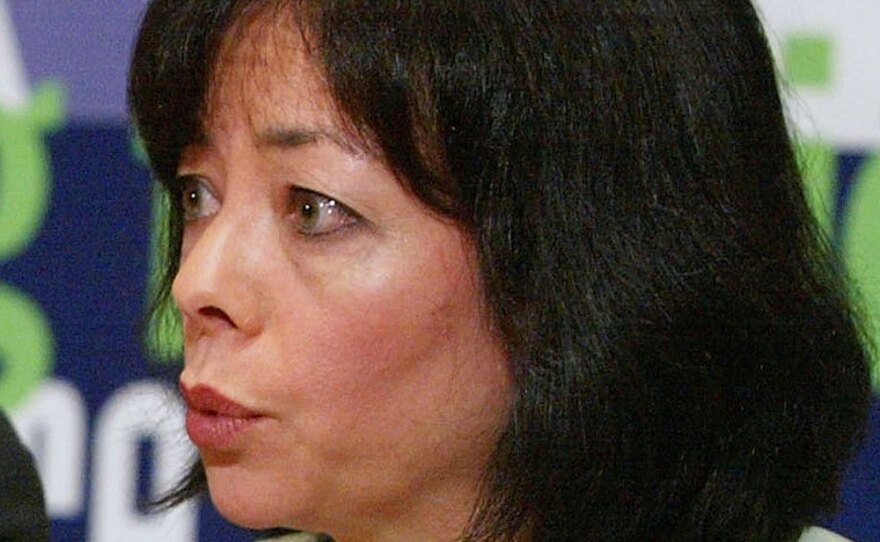The White House on Wednesday criticized ultimately unsuccessful efforts by the labor unions to unseat Sen. Blanche Lincoln of Arkansas in the Democratic primary, saying the money would have been better spent battling Republicans in November.
The debate illustrates the kind of family squabble that's grown up between organized labor and President Obama.
When Barack Obama was elected less than two years ago, union members felt they had something to celebrate. The new president had been in office barely a week, when he invited labor leaders to a White House event.
Obama quickly signed executive orders reversing several Bush-era policies seen as harmful to unions. Berkeley professor Harley Shaiken, a professor at the University of California, Berkeley who studies organized labor, says unions believed that was just the beginning.
"There was really euphoria when President Obama won. Organized labor was a vital part of that winning coalition," he said. "Labor put everything forward. There was enormous excitement and considerable resources in play. So it was viewed as a major victory."
But 1 1/2 years later, Shaiken says, unions are questioning whether the president has fought hard enough on their behalf. They were disappointed when he jettisoned a public option from the health care overhaul. And they are especially frustrated that "card check," a measure to make union organizing easier, has remained bottled up in Congress.
"There's a feeling that the president's heart may be in the right place, but he has not been aggressive enough on issues that have been key to labor," Shaiken said.
Unions channeled all that unhappiness into a campaign to oust Lincoln in the primary, and replace her with another Democrat.
Lincoln had earned the union's wrath by opposing card check, the public option and the appointment of a union lawyer to the National Labor Relations Board. Never mind that Arkansas has the second-lowest rate of union membership in the country.

Thea Lee, deputy chief of staff for the AFL-CIO, says union members were "fired up."
"We wanted to send a message to Blanche Lincoln, but also to other Democrats, that the labor movement has priorities and we are hoping that candidates for office and certainly incumbents will stand with us," Lee said.
The union-backed candidate, Lt. Gov. Bill Halter, gave Lincoln a run for her money forcing a runoff but falling a few percentage points short on Tuesday.
Obama backed Lincoln in the primary and the runoff. Lee insists that's not a sign of a broader breakdown between the White House and organized labor.
"I think we have a strong relationship with the White House and President Obama, and we support a lot of the initiatives they've put in place whether it's health care reform, the recovery act, financial reform," she said. "None of those are perfect, none of them go quite as far as we'd like to see them go, but they're all in the right direction.
There's a feeling that the president's heart may be in the right place, but he has not been aggressive enough on issues that have been key to labor.
"And so we certainly support the White House. We're not going to agree on every issue, and we're certainly not going to agree on every single candidate. But it's OK for friends to disagree at times."
The disagreement turned testy on Wednesday. After Lincoln's win, the Washington website Politico quoted a senior but unnamed White House official complaining that organized labor had "just flushed $10 million of their members' money down the toilet on a pointless exercise."
Obama himself might not put it that way, spokesman Robert Gibbs said. But the sentiment is not far off.
"We're likely to have very close elections in very many places throughout the country in November," Gibbs said. "That money might come in more handy then."
That's exactly the kind of pragmatic calculation the White House has brought to many battles over the past year and a half. And it's exactly that kind of calculation that often angers the president's most liberal supporters.
Gibbs says people who backed either Lincoln or Halter in the primary now have an obligation to rally around the Democratic nominee. But former AFL-CIO political director Steve Rosenthal says don't count on it.
"There will be places where labor will be fighting strong with the Democrats. And there may be some places where the Democrats will be fighting strong on their own," Rosenthal said. "Not every union is going to be rushing to defend every Democrat because they have a D after their name."
Ultimately, that's how organized labor can punish a candidate it doesn't like. If unions are unsuccessful choosing a different nominee, their members can always stay home on Election Day.
Copyright 2022 NPR. To see more, visit https://www.npr.org. 9(MDAzMjM2NDYzMDEyMzc1Njk5NjAxNzY3OQ001))







